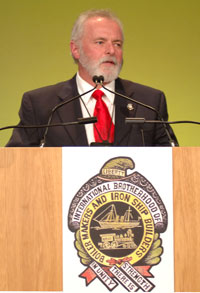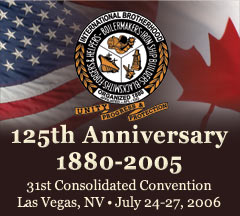International Secretary-Treasurer William T. Creeden's address to the Brotherhood
President Jones, Members of the Executive Council, Delegates, Friends and Honored Guests: Greetings and welcome to Las Vegas and the 31st Consolidated Convention of the International Brotherhood of Boilermakers. It is both an honor and a privilege to be here with you today. I would like to take this opportunity to welcome our former officers and their families and to recognize my office staff. Roseanne, Susie, Tara and Jennifer, without your hard work and dedication, both here and in Kansas City, my job would be immensely more difficult. Thank you all. And a special thank you to my former secretary of 12 years, Tracy Buck. As I stand here today I see a lot of delegates that I know, some for more than 25 years. There are, however, a lot of delegates here that I haven't had the opportunity to meet. In way of background, I began my career as a field construction boilermaker in Local 627, Phoenix, Arizona as an apprentice. I completed my apprenticeship in early 1980, continued to work with the tools and was subsequently elected as a lodge trustee. In the early '80s, under another Republican administration, not unlike the current one, Local 627 began losing work to nonunion employers. Until that time, we had performed virtually all of the work within our allocated jurisdiction. Everyone recognized that something had to be done. The question was how. The International responded and in early 1986, Barry Edwards was assigned to help Lodge 627 address the problem. At that time, Barry was a business agent in Lodge 30, Greensboro, North Carolina. He was working with then International representatives Newton Jones and Connie Mobley, implementing the most effective strategy ever designed to organize in the construction industry, a strategy that would later be named Fight Back. I began assisting Barry as an unpaid volunteer organizer. And in 1986 we worked together on a number of campaigns in Arizona and New Mexico. We continued to work together until Barry's untimely retirement in 2005, due to a severe neck injury. Barry, your contributions to the success of the Fight Back program are legendary. Please stand and be recognized. In January, 1987, president C.W. Jones offered, and I accepted, an appointment as a temporary general organizer. It's the longest temporary job I've ever had. I was assigned to work with Newt Jones, Connie Mobley and Barry Edwards. And since that time I've served our Brotherhood in a number of capacities: as a general organizer, assistant to the director of organizing, and as an assistant to the International president and the director of organizing. On November 1st, 2005, upon the retirement of Secretary-Treasurer Jerry Wilburn, our International president and my good friend, Newton Jones, appointed me International Secretary-Treasurer pro tem, pending International Executive Council approval. Brothers and Sisters, I was honored and humbled by the faith and confidence placed in me by President Jones. At the International Executive Council's December 2005 meeting, President Jones nominated me for the office of International Secretary-Treasurer. I was again honored and no less humbled by the executive council's unanimous confirmation of President Jones' nomination. Since November 1st, 2005, I have fulfilled the duties and responsibilities of this office. And during that time had the opportunity to work with a number of our elected lodge officers. I can state this as fact, no International union has better, more dedicated or harder working lodge officers than this International Brotherhood. Nor does any International union have better, more dedicated or harder working elected officers and International staff. The officers' report was distributed this morning and contains detailed financial information covering the last five years. I encourage all of our delegates to review it thoroughly. I will, however, provide a brief synopsis of the Secretary-Treasurer's Report. For the five-year period ending December 31st, 2005, we initiated and/or reinstated 40,488 members. However, during that same time frame, there were 49,623 terminations, for a net loss of 9,135 members. At the current per capita tax rate of 20.65 per month, this represents a loss of 2.26 million in annual per capita tax payments. As of December 31st, 2005, our consolidated funds balance was $55,676,187, a drop in net assets of $2,488,164 since December 31st, 2000. Over the past three years, International President Jones, with the full support of the Executive Council, implemented a series of cost-cutting initiatives that will result in net savings of five and a half million dollars annually going forward. Due to the cost-saving measures that have been enacted, the bleeding has finally stopped. And I am pleased to report that as of May 31st, 2006, both the general fund and the consolidated funds are in the black. Membership loss is a major concern. It reduces our strength, our bargaining power, our political power, and our revenue, and thereby our ability to organize. Although many of the recorded terminations are due to retirement, our membership loss is largely due to the flawed trade policies of our federal government — policies that encourage the export of high-paying manufacturing jobs to third world countries. And while we meet here this week, Congress is set to consider yet another flawed trade agreement. The Oman Free Trade Agreement or OFTA seeks to expand to the Middle East the broken models of NAFTA and CAFTA, further encouraging the exploitation of low-wage workers. As in CAFTA, the Oman Free Trade Agreement requires only that Oman enforce it's existing labor law. In Oman, even the most basic labor rights — such as collective bargaining and the formation of independent unions are illegal. This flawed trade agreement means the elimination of even more American manufacturing jobs as multinational corporations continue their race to the bottom. Brothers and Sisters, we have an extremely important election this November, and we must elect politicians who not only recognize the value of skilled labor but who refuse to be the pawns of corporate America. One of the primary functions of the International Secretary-Treasurer's office is the collection of revenue. At any given time, with the possible exception of the three months immediately preceding a convention, there is over $1 million in per capita tax owed to the International. Many of our lodge secretary-treasurers spend countless hours of their personal time completing paper membership reports, time that could otherwise be spent with their families. And although critical to the very existence of this Brotherhood, for the large part, it's a thankless job. The process we now use is antiquated, tedious and time-consuming. It is my intent to utilize the technology available today and to make the process more efficient and less time-consuming. One of the first steps in this process is to move away from paper membership reports and to begin reporting electronically. In the last few months, our information technology department rolled out a web-based version of the Brotherhood's membership report. Several lodges have tested the program and found it to be both an easy and efficient method to post monthly dues and process address changes online. The electronic data is then imported into the Brotherhood's membership reporting system, thereby eliminating redundant data entry and greatly expediting the overall process. In the near future, upon completion of testing, this program will be made available, free of charge, to all local lodges. Currently, many lodges have their dues check-off sent directly to International. The membership department keys the report, calculates the per capita tax due International and remits the balance of the check off back to the local lodge via paper check. This process could be expedited by using direct deposit and transferring funds via the Federal Reserve system. The process could be further expedited if the lodge established a checking account with Brotherhood Bank and Trust. Then any monies due the lodge could be deposited within 24 hours of completion of the membership report, making the funds readily available to the local lodge. Article 14.1 of our Constitution currently allocates International per capita tax to four constitutional funds: 79 percent to the general fund, 15 percent defense fund, 3 percent convention fund, and 3 percent official publication fund. This allocation of funds serves no purpose and creates an accounting nightmare that requires constant inter-fund transfers to keep fund balances straight. This process could be simplified by placing all per capita tax revenue in the general fund. This would also simplify the management of our investments. Article 15 of the International Brotherhood's Constitution established a $1,000 death benefit for members who had 25 or more years continuous service in the International Brotherhood as of August 1st, 1970. Since our last convention, death benefits have been paid to the families of 612 eligible members. As of December 31st, 2005, 1,904 members remain eligible for this benefit, and the funds unaudited balance was $2,195,162. In the five-year period ending December 31st, 2005, a total of 206 lodges received preliminary instruction letters for strike action that did not materialize. Strike or victimization benefits totalling $1,123,041 were paid to members of 12 lodges in accordance with Article 16 of the International Brotherhood's Constitution. Brothers and Sisters, there are a number of recommendations from the Law Committee that will help improve the collection of revenue, help simplify accounting methods, redistribute the current allocation of per capita tax and eliminate the death benefit fund, while still maintaining the death benefit for eligible members. I urge all of our delegates to support the Law Committee's recommendations. Our current headquarters complex consists of two buildings, the old Brotherhood Building, which was built in 1894, and currently houses the Boilermakers' National Funds and the main office of Brotherhood Bank and Trust, and the new Brotherhood Building, which was built in 1949, and houses the International's offices and multiple tenants. It costs over $2 million per year to keep these two buildings operational, while at the same time property taxes increase and, due to a deteriorating neighborhood, property values decrease. Many of you have probably seen the Tom Hanks movie The Money Pit. Simply put, our current headquarters is a money pit. And the sooner we can build new facilities and relocate, the better. With that in mind, the International Executive Council, with the intent of building a new headquarters complex, authorized the purchase of a 23-acre tract of land in north Olathe, Kansas. Preliminary design is under way. The architect's renderings of this complex are being displayed on the outward screens. Brotherhood Bank and Trust will also relocate their headquarters to this site and hopefully the national funds. This is my fifth convention; the first one was in 1986 in Hollywood, Florida. I've seen solidarity and division, good times and hard times. But throughout the years one thing has remained constant, our International officers, International representatives and local lodge leaders, have continued to fight for worker's rights, and because of their tenacity and single-minded dedication, we are a greater organization today. Our members enjoy better wages, benefits and working conditions than at any other time in the history of this Brotherhood. Brothers and Sisters, we have a lot of work ahead of us and a lot of great activities planned. I look forward to working with all of you and wish you the best for a great convention and the best of luck on the casino floor. Thank you. |








